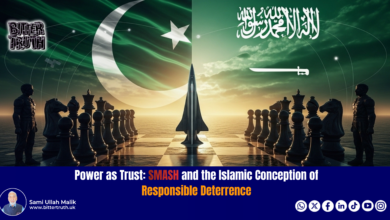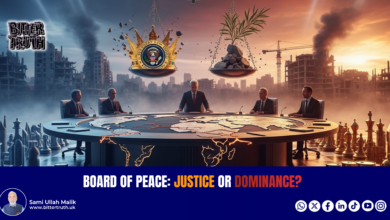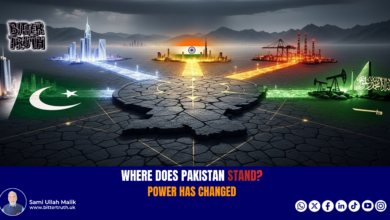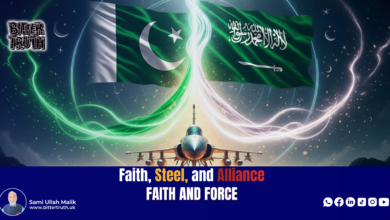A Tale of Global Powers’ Intervention and Atrocities
The Cost of Destruction and the Apologies of the Powerful
One might ask the United States why it crosses seven seas and travels thousands of miles to the Middle East, the Gulf states, South Asia, and Central Asia, armed with forces and conspiracies. The answer is simple: it comes to sell death and buy life. This venture involves not just expansionist ambitions and criminal enterprises but also the misuse of power and elements of religious fanaticism. If the U.S. had a genuine love for humanity, peace, and harmony, if it despised poverty, ignorance, and disease, the world would be a paradise today. The world would not have to cross seas of fire and blood or rely on weapons and explosives to achieve these goals. All that would be required is the principle of “live and let live,” respect for human dignity, equality between the powerful and the weak, without discrimination of race, religion, or colour. Essential conditions include mutual respect, recognising a nation’s freedom, respecting borders, and, most importantly, refraining from interfering in another country’s internal affairs.
Yet, the seller of death and buyer of life, who pretends to be a champion of peace and harmony, has built high and mighty protective walls around itself. The people living within these walls are both human and acquainted with humanity, free and safe from the poison of arms and ammunition. Can the poor, weak, and destitute countries ravaged by hunger, poverty, and disease even dream of penetrating these borders? Only the hawks, perpetually in search of prey, possess such power, attacking at will and tearing apart the very fabric of humanity.
The bloodthirsty hawks, who feast on the bodies of naked and hungry humans, are relentless in their search for terrorists among the very people who suffer at their hands. These terrorist hawks have no principles of their own and, in their hunt for prey, have at times fought amongst themselves. In 1950, Britain, France, and the United States signed a tripartite agreement, under which the security of all Middle Eastern borders was guaranteed on the condition that no party would engage in aggression. But the West, driven by greed, could not remain at peace. Only six years after this agreement, Britain and France attacked the Suez Canal—a story in its own right. At present, three fundamental interests of the United States and its allies are under scrutiny.
The first is to dominate the resources of the Gulf countries, which supply 60% of the world’s oil, and establish their hegemony in the region. (The Soviet Union was also part of this race.) As part of its policy, the U.S. not only guarantees Israel’s security but aims to strengthen it to such an extent that Arab countries live in constant fear, allowing the U.S. to impose its policies on them. At the same time, under the guise of friendship, the U.S. has secured control over the economy and defence sectors of certain Arab states, including Saudi Arabia, Egypt, Jordan, and the monarchies of the Gulf, ensuring their survival against the Israeli threat. As a result, American forces are stationed in these countries, particularly Saudi Arabia, burdening these states with the cost of maintaining them. Meanwhile, the presence of U.S. forces provides a sense of security for Israel.
After the revolution in Iran, the U.S. lost a trusted ally. As a result, it developed rapid-deployment forces aimed at protecting its global interests, particularly in the Gulf. Iraq, Syria, and Lebanon were free from U.S. control but fell under Soviet influence. After losing Iran, the U.S. turned its attention to Iraq, exploiting the longstanding border and other disputes between Iraq and Iran. The U.S. successfully incited war between the two nations in an attempt to crush the Iranian revolution. The eight-year Iran-Iraq war inflicted heavy human and financial losses on both sides, while arms manufacturers in the U.S. and other nations profited by selling $83 billion worth of weapons to both countries.
Iran saw an opportunity to achieve its goals, including the end of Saddam’s regime, in these border disputes. The stage was set for war, with Gulf states given signals of non-cooperation, while other Islamic countries outside the Gulf were either invited to join or urged to remain neutral. Western allies began preparing for war, and Gulf states were ordered to purchase weapons in the name of self-defence. The Gulf War alone earned U.S. defence industries approximately $210 billion from Gulf nations, with Saudi Arabia purchasing around $60 billion worth of arms. During Trump’s tenure, defence contracts worth $300 billion were signed, reviving arms manufacturing companies.
At U.S. instigation, Israel increased its provocations against Iraq and accelerated its oppression of Palestinians. Apart from a few countries, nearly all Gulf states sided with the U.S. against Iraq. U.S.-backed Kurdish movements intensified, while American intelligence agencies successfully reignited dormant sectarian, ethnic, and provincial tensions. The conspiracy to divide Iraq’s armed forces succeeded. Saddam Hussein, who prided himself on promoting secularism and socialism, believed he had united the diverse sects, ethnic groups, and provinces under an Iraqi nationalist identity, only to find that internal divisions were tearing his nation apart.
In January 2002, during his State of the Union address, President Bush presented a justification for attacking Iraq, labelling Iraq as part of the “Axis of Evil” and accusing it of possessing the world’s most destructive weapons. However, U.S. Speaker Nancy Pelosi had opposed the Iraq resolution, which authorised Bush to use military force against Iraq. Bush’s closest ally, British Prime Minister Tony Blair, had ordered British troops into combat five times in the first six years of his premiership, more than any other British prime minister in history. These instances included Iraq in both 1998 and 2003, Kosovo (1999), Sierra Leone (2000), and Afghanistan (2001). During this period, the then-UN Secretary-General Kofi Annan declared the invasion of Iraq illegal. The International Commission of Jurists in Geneva confirmed that the attack on Iraq was neither an act of self-defence against an armed attack nor authorised by a UN Security Council resolution, thereby making it an act of aggression, a war crime.
The Iraq War resulted in 4.7 million deaths, and $450 billion worth of Iraqi oil was looted. In 2020, Neta Crawford, head of the political science department at Boston University, estimated the long-term cost of the Iraq war at $1.922 trillion. The U.S. had accused Iraq of possessing nuclear and chemical weapons (which were never found) and attacked Iraq with its full military might, reducing the country to rubble. The entire nation was engulfed in fire and bloodshed. Thousands of Iraqis, including the elderly, children, and women, were mercilessly killed, with holy sites targeted. The world watched in horror as the atrocities in Abu Ghraib prison unfolded, exposing the degradation of Iraqi dignity, while Iraq’s military turned against Saddam Hussein. All the missiles, aircraft, and military equipment became useless. Saddam Hussein was eventually hanged, following his defiance of the U.S., but the world also witnessed U.S. Secretary of State Colin Powell and Tony Blair later apologising for the war in Iraq. The question remains: why have those responsible for this devastation not been brought to justice at the International Criminal Court?
The issue did not end there. As soon as, after three decades, Egypt’s elected government began asserting its sovereignty, it was swiftly overthrown, and a representative acceptable to the West was installed. Simultaneously, the monarchs and rulers of the Gulf states were assured that their reign would remain secure as long as they remained subservient to the U.S. and the West. The ongoing Israeli aggression and brutality, carried out with the support of the U.S. and the West, and the criminal silence of the regional countries, stand as clear evidence of this. Peace-loving people across the world are asking: when will these merchants of death be held accountable?






